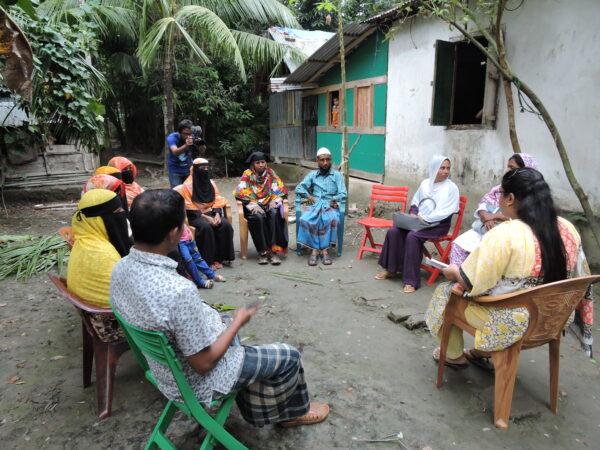
Picture taken by Shahrina Rahman: discussion with people with disabilities
By Shahrina Rahman
The adverse effects of failing to reduce greenhouse gas emissions disproportionately affect the people and communities, rationally affecting the people who are already disadvantaged by a lack of social and economic support (Harlan et al. 2015). Their human rights to live with dignity, and benefit from clean, healthy, sustainable environments and livelihoods, are already being violated. Climate change exacerbates the risk of other human rights violations, including violence against marginalised people with disabilities (PWDs) in developing countries, who face abuse, displacement, discrimination, and systematic exclusion. The inability of this disadvantaged group to raise their voice in their communities is a high-priority concern. Yet human rights, and the financing required to realise them, have yet to be mainstreamed in climate change discussions, including the annual COPs (Conference of Parties). The parties meeting in Sharm-el-Sheikh, Egypt, for COP27, and the United Nations Human Rights Council, have stressed that little progress has been made in human rights or climate action.
After years of negotiation, these one billion vulnerable people (PWDs) are still fighting for their right to participate in the development programme. Therefore, failure to address the disabled community and their rights in relation to climate justice not only reinforces social inequality and undermines climate resilience but leaves the life of PWDs at risk. I am a final-year doctoral student at the school of Agriculture Policy and Development programme in the Department of International Development. My research focuses on marginalise people with disability living in disaster-prone areas in the global south. My research has explored the two most disaster-prone southern coastal districts in Bangladesh to analyse conceptual and empirical evidence to understand the link between a well-functioning Disaster Risk Reduction strategy and the well-being of disabled people in Bangladesh. My research findings also show that governments continue to fail to perform their duties to respect, protect, and fulfill the rights of PWDs in their response to climate change. Besides, policy implementation could be costly for developing countries: financial support is needed to develop technical capacity within both climate and disability sectors to ensure PWDs are not left behind.
The COP27 conference was indeed ground-breaking for PWDs as the number of participants was greater than in earlier conferences. In several events, governments, UN agencies and other stakeholders have mentioned disability. The arrangements, however, were far from perfect. Disabled activist Pauline Castres has called on the Climate Change Conference to “stop excluding disabled people.” For example, banning cars from certain streets and building inaccessible charging points for electric vehicles have been defined as discrimination against PWDs attending the COP27 conference. On the closing day of the COP27, Climate Conference Secretary-General Antonio Guterres said, “This COP has taken important steps towards justice.” UN Climate Change Executive Secretary Simon Stiell said, “The outcome will benefit the most vulnerable around the world.” Yet no decision was made about who should pay, where the money will come from, and which countries will benefit; those matters are left for next year’s COP28. Therefore, involving Disabled People’s Organisations (DPO) in all COP processes is a matter of high priority since they have an essential role to play in the advancement of climate action, and PWDs must have meaningful participation in decision-making, so that their voices are heard along with other vulnerable people!

